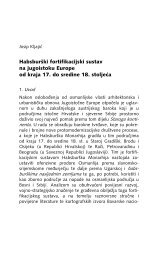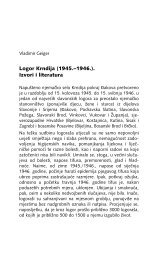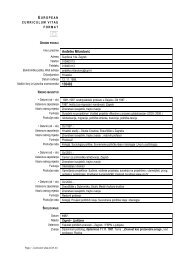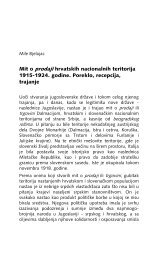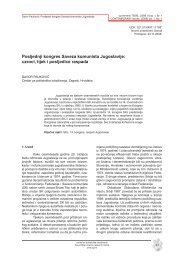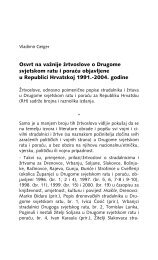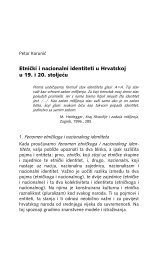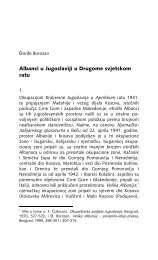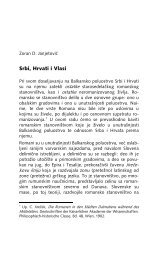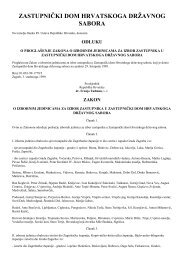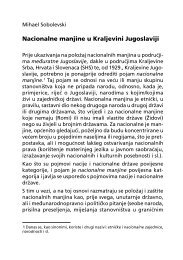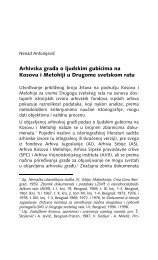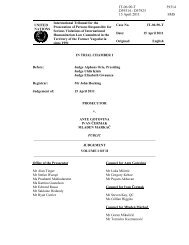ISSN 1847-2397 godište II broj 1 2009. | volume II number 1 2009
ISSN 1847-2397 godište II broj 1 2009. | volume II number 1 2009
ISSN 1847-2397 godište II broj 1 2009. | volume II number 1 2009
- No tags were found...
You also want an ePaper? Increase the reach of your titles
YUMPU automatically turns print PDFs into web optimized ePapers that Google loves.
Plamena Pehlivanova: The Decline of Trust in Post-communist Societiessuvremene TEME, (<strong><strong>2009</strong>.</strong>) God. 2, Br. 1CONTEMPORARY issues, (<strong>2009</strong>) Vol. 2, No. 1underground communities still remained in thecollective consciousness, as people becameeven more secluded around their tight circlesof family and friends. The family bonds becamethe new cradle of trust that might have resultedin the low levels of bridging and out-group trust.Trust toward government institutions and formalorganisations have dramatically declined in accordwith the decline in social and political participation.Through my observations of the Bulgariansociety from 2000 to present, I propose thatthe informal personal contacts, rather than formalinstitutional participation, tend to generatesocial trust and hamper institutional legitimacy.The family substitutes the role of the institutionas it provides for value priorities and moral resourcesfor one’s realisation. Contrary to theTocqueville 1 and Putnam model, I propose thatin Bulgaria and Russia, such personal relationsgenerate trust and intermediary organisations donot. Furthermore, the paper will study the levelsof trust in comparison to the levels of participation;to the level of economic development, andthe development of the family structure as an influentialfactor of trust and social/political participation.The study will focus on the developmentof post-communist Bulgaria and Russia (from1999 to the present) and it uses the Chinese andDutch societal model for comparison.2. IntroductionWith the fall of communism in both postcommunistcountries (Bulgaria and Russia) theformal public participation declined in accordwith the decrease in social and political trust.However, the interwoven structure of the familyfunctions as the epicentre for the continuation ofsocial traditions. From the World Value Surveywe learn that people in both countries trust mosttheir families and close friends, and distrust anykind of social and political structures (esp. government).We also see that most participationtakes place in activities involving tight social circlesand less in any kind of formal (sport, church,work) organisations, and least in any kind of politicalor governmental institutions. For example,the World Value Survey shows us that - in Russia38.5% and in Bulgaria 24% of society does nottrust the Parliament at all, in contrast to the Neth-1 Civic and political organisations educate individuals aboutbeing citizens in a free society. Such groups may also formalliances with like-minded organisations in order to lobbyor coordinate their advocacy messages. Most importantly,these organisations become reservoirs of social capital andtrust.erlands with 4.8%. Furthermore, from the surveysections — “Frequency of spent time”, we noticethat Bulgaria and Russia prevail in spending timewith family and friends and minimal with formalorganisations (like church, sports and communalorganisation). It is shocking to note that 79.6% ofthe Bulgarian and 67.8% of the Russian populationclaims “not involved” in any voluntary organisations.Whereas in the US and the Netherlandsthe cultural participation has dramatically risen,Bulgaria and Russia report almost 90% of theirpopulation as “no member of any organisation”. 2According to the results from the Eurobarometersurvey for 2004, the Bulgarian institutionswere facing a crisis of confidence. Lowlevels of trust have remained the same (sincethe fall of the regime) for most of the nationalpolitical institutions, while some “don’t knows”have been transformed into negative opinions.Plamen Georgiev claims that, “the result is 10points decrease in trust in the National Parliament(81%), 6 point decrease in political parties(83%), a 7 point decrease in national government(70%) and 5 point higher mistrust in the Bulgarianjustice system (70%).” (Plamen, 2007: 138).Out of all countries surveyed by the Euro barometer,Bulgarians tend to mistrust the most theirnational legal system. The survey also showsthat, out of all countries polled, Bulgarians andRomanians are the most dissatisfied with theirquality of life. While pessimistic about the politicalinstitutions and their quality of life, Bulgarianshave shown high expectations towards the EuropeanUnion. Particular support and optimism hasbeen reflected by young people between 15 and24 years of age. In general, the Euro-barometerreports show that Bulgarians have become lesspessimistic in national terms and more realisticin their Euro-optimism and the role of Europe inthe future of their country. However, what is thereason for the decline of trust and participationafter the fall of the regime? How can we comparethe Bulgarian case with the Chinese sociopoliticalmodel? How do we fight antagonismand growing pessimism in the Balkans?2 The survey results have been extracted from the WorldValue Survey – Bulgaria (1999) and Russia (1999)centar za politološka istraživanjathe political science research centrewww.cpi.hr33



